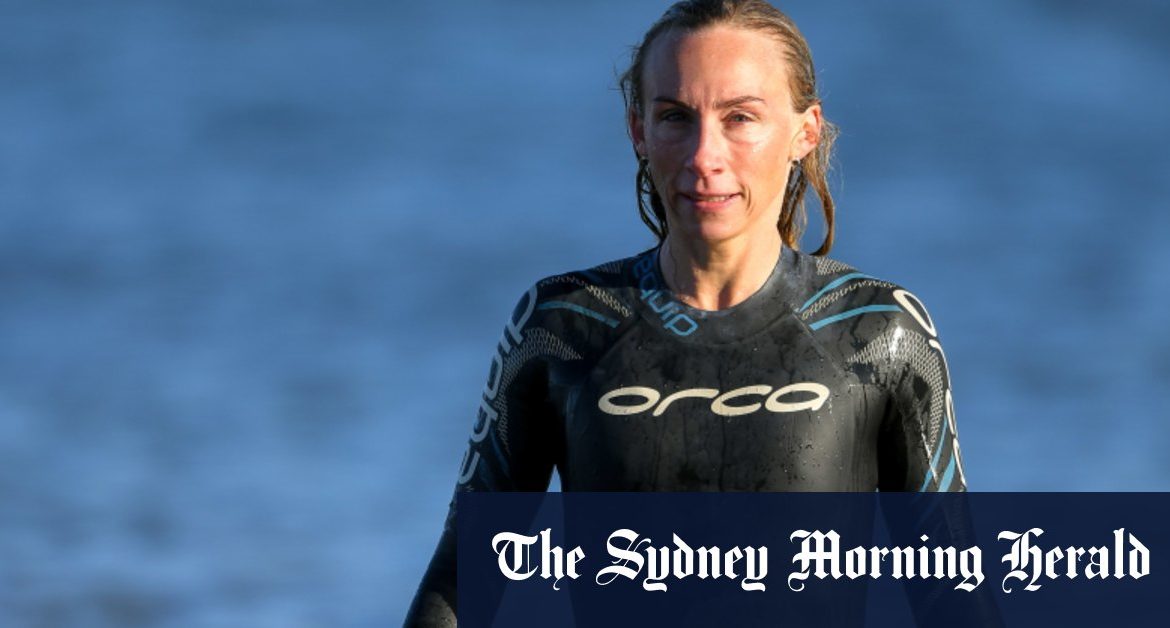Ocean swim races will be a little bit different this summer. There are limits on numbers, and most entries must be made online. Another difference, especially for Victorians, has been that pre-season training has not happened as usual due to pool closures.
Ellercamp says, “There was a dampener on pool squads and swimming over winter with COVID-19, but that’s not a major issue now. Everyone who wants to train in a pool can do so. There was a surge in winter swimming in the ocean over winter. Regular winter swimmers will tell you how the number of swimmers on beaches over winter was well up on previous years. So lots of swimmers have been preparing for the season by swimming in the sea.”
One of those swimmers is Whitney Sloan from the bayside suburb of Brighton, Victoria, who took up ocean swimming for the first time during Melbourne’s strict lockdown.
“It actually started as a bit of a joke… When the five-kilometre limit came in, I looked up my address and half of my radius was in the water,” says Sloan. “So I thought, why don’t I just get in it?”
Reflecting on the first time she braved the open water, the yoga studio owner says the temperature took her breath away. “I had booties and a thermal cap but it still really surprised me. Once you move through that though, it feels good – your body is amazing, it gets used to it,” she says.
Loading
Sloan started swimming 500 metres off Brighton Beach in July to “learn something new and challenge myself”, and is now working towards qualifying for WA’s 20-kilometre Rottnest Channel Swim in February with the help of her coach Peter Hendricks of SwimWell.
Hendricks says anybody looking to take part in an ocean swim should get some formal instruction.
Ellercamp agrees: “No swimmer should take part in an event unless they are swimming regularly and unless they are comfortable and experienced in handling surf.”
“We coach in the water with the swimmer, not standing on the side of the pool,” says Hendricks. Swimming efficiently, he says, is all about body position and an efficient stroke. “People need to physically be put into position. It does feel weird but that weird needs to become the new normal.”
Once people do know how to swim with an efficient stroke, Hendricks says that a one kilometre swim is manageable for most people. “If they train, they will do it quicker.”
Andre Slade of Oceanfit trains new and experienced ocean swimmers and he does recommend pool training as well as training in the ocean. “If you’re looking to become a stronger, fitter surf swimmer, then on top of lots of surf swimming, the pool is the best place to build your strength, speed and fitness.”
Andre Slade of Sydney’s Oceanfit recommends learning some entry-level tips to build confidence in the surf.Credit:Peter Rae
“You need strength as a surf swimmer because on the way out through the waves, you’re swimming against the ocean. The waves, currents, energy and even water density and wind, can be against you.”
In New South Wales the sports charity Can Too is currently running its ocean swim training pods, and there will be autumn training available too. Since 2005, Can Too has trained over 5,500 people how to swim safely in the ocean whilst fundraising for cancer research.
CEO Peter McLean says, “We knew there was strong demand and appetite for a swim program as our community and other people were very keen to join a program to help their fitness, health and wellbeing during such a challenging year.”
For beginner ocean swimmers – those not able to take part in a formal training program or who have not done as much training as usual – Slade suggests picking an event location without surf, like a protected bay or harbour. “Choose a shorter distance to start with. Most swims will have a one kilometre distance, and some might even have a distance around 500 metres which is very achievable.”
Loading
Oceanfit has an extensive website with online training options as well as open water training. Slade says, “If you’re choosing a short distance at a relatively protected beach, then you won’t necessarily need weeks of ocean swimming training, but it is a good idea to learn some entry-level tips and techniques to give you increased confidence.”
Most ocean swimmers are in it to swim it, rather than win it. As Paul Ellercamp says, “That’s the point of all this stuff: the mental health benefits that come from the activity and the camaraderie.”
And that is as true for ocean swim racing as it is for regular ocean swimming, which for many people has been one of the unexpected upsides of COVID restrictions.
Get a little more outta life
Start your week with practical tips and expert advice to help you make the most of your personal health, relationships, fitness and nutrition. Sign up to our Live Well newsletter sent every Monday.
Most Viewed in Lifestyle
Loading







